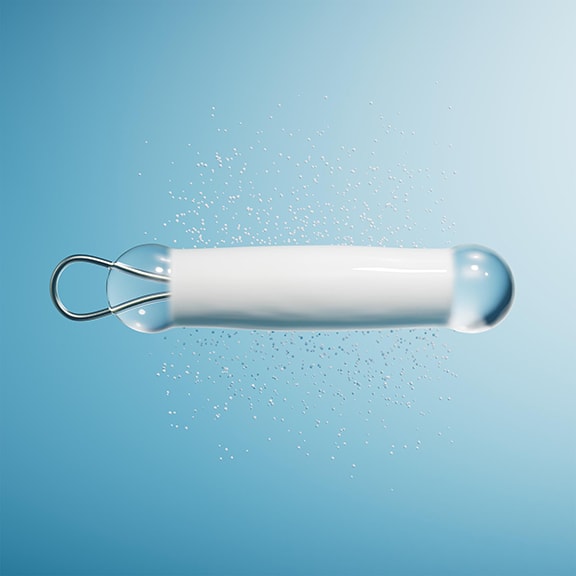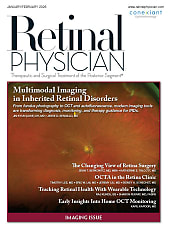A transcript of the video narration is below:
Hello, my name is Lloyd Clark, MD. I'm a retina specialist based in South Carolina. I’m pleased to be at Retina World Congress this year presenting data from a pooled functionality analysis of the NT-501 implant (Encelto; Neurotech Pharmaceuticals) for macular telangiectasia (MacTel). This is a very exciting new technology in retina. This device is the first approved therapy for patients with macular telangiectasia. This disease causes progressive neurodegeneration of the retina and progressive vision loss in patients as they age, and so we're very excited to have a new treatment available for these patients that affects approximately 150,000 people in the United States.

Figure 1. Encelto is a small, semi-permeable capsule that is surgically implanted. It contains retinal pigment epithelium (RPE) cells genetically engineered to produce therapeutic proteins for targeted disease treatment.
I presented data from a pooled analysis of 3 clinical trials, a phase 2 clinical trial, and 2 parallel phase 3 clinical trials evaluating the NT-501 implant compared to placebo. As a review, the implant is encapsulated cell technology, which elutes ciliary neurotrophic factor, a protein that has been demonstrated to protect against neurodegeneration of the retina.
In all 3 of these clinical trials, we looked at both anatomic as well as functional outcomes in patients treated with NT-501 compared to placebo. In terms of anatomic outcomes, these patients who were treated with the NT-501 device had significantly reduced rates of ellipsoid zone loss, an important OCT biomarker in vision loss associated with MacTel. When we think about functional outcomes, we evaluated reading speed as well as retinal sensitivity. Reading speed was profoundly protected in patients with the NT-501 implant compared to placebo, and the rate of loss of macular retinal sensitivity was also significantly slowed with the NT-501 device.
In summary, we now have our first treatment available for MacTel, the NT-501 encapsulated cell technology device. This is a very exciting treatment for patients with MacTel. It has been approved by the FDA. We look forward to its commercial availability in the United States in the next few months. RP








